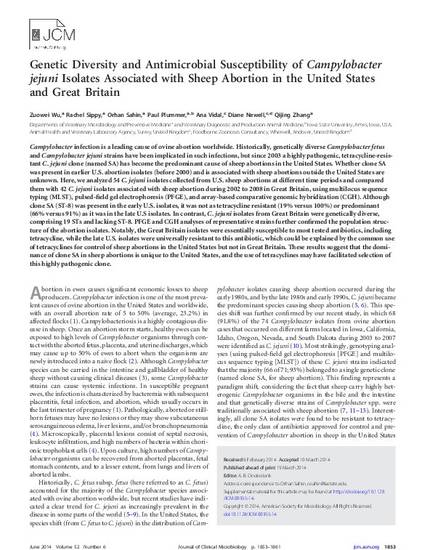
Campylobacter infection is a leading cause of ovine abortion worldwide. Historically, genetically diverse Campylobacter fetus and Campylobacter jejunistrains have been implicated in such infections, but since 2003 a highly pathogenic, tetracycline-resistant C. jejuni clone (named SA) has become the predominant cause of sheep abortions in the United States. Whether clone SA was present in earlier U.S. abortion isolates (before 2000) and is associated with sheep abortions outside the United States are unknown. Here, we analyzed 54 C. jejuniisolates collected from U.S. sheep abortions at different time periods and compared them with 42 C. jejuni isolates associated with sheep abortion during 2002 to 2008 in Great Britain, using multilocus sequence typing (MLST), pulsed-field gel electrophoresis (PFGE), and array-based comparative genomic hybridization (CGH). Although clone SA (ST-8) was present in the early U.S. isolates, it was not as tetracycline resistant (19% versus 100%) or predominant (66% versus 91%) as it was in the late U.S isolates. In contrast, C. jejuni isolates from Great Britain were genetically diverse, comprising 19 STs and lacking ST-8. PFGE and CGH analyses of representative strains further confirmed the population structure of the abortion isolates. Notably, the Great Britain isolates were essentially susceptible to most tested antibiotics, including tetracycline, while the late U.S. isolates were universally resistant to this antibiotic, which could be explained by the common use of tetracyclines for control of sheep abortions in the United States but not in Great Britain. These results suggest that the dominance of clone SA in sheep abortions is unique to the United States, and the use of tetracyclines may have facilitated selection of this highly pathogenic clone.
Available at: http://works.bepress.com/qijing-zhang/9/

This article is from Journal of Clinical Microbiology 52 (2014): 1853, doi:10.1128/JCM.00355-14. Posted with permission.